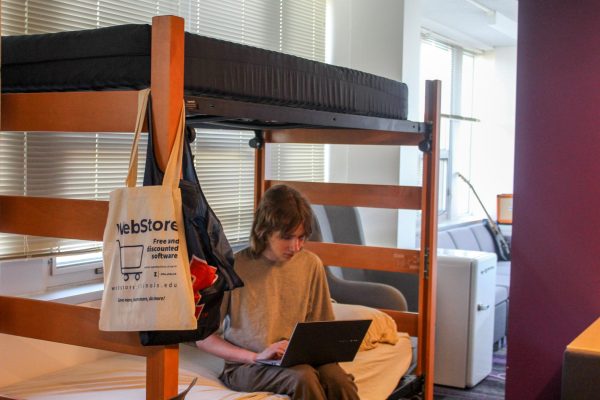Domestic Violence Awareness Month highlights daily issue
Oct 17, 2017
Women between the ages of 18-24 experience the highest rate of intimate partner violence, almost double the national average, according to the National Center for Injury Prevention and Control, Centers for Disease Control and Prevention. Because October is Domestic Violence Awareness Month, the University is looking to promote the resources available to survivors on campus.
Sarah Colome, director of the Women’s Resources Center, said domestic violence is often an overlooked issue on college campuses, even at the University of Illinois.
“I’ve had at least two or three people come in every day within the last week to seek services,” Colome said.
There are several people to speak to on campus, but Colome said the Women’s Resources Center is the only place that is confidential. Most other resources have to file reports, making it easy to share and identify the problem faster.
“The goal is to make the campus a safer, more equitable place to live. Even if you don’t identify as a woman, you still have a place here at our events,” Colome said.
Get The Daily Illini in your inbox!
The most common cases at the Women’s Resources Center are sexual abuse or assault, domestic violence, dating abuse, stalking, sexual exploitation and sexual harassment.
“If we can’t do it here we will find the person to help them,” Colome said.
Colome clarified what constitutes as domestic or dating violence, which is often overlooked by young people.
Excessive monitoring, such as constantly looking at your partner’s geolocation, perpetual texting, name calling, screaming and yelling, guilting and coercion are the most common, Colome said.
“So those kind of things tend to get written off as normal and signs of extreme love when in actuality they’re not healthy at all,” Colome said.
The College Dating and Violence Poll calculated that nearly half of all college women report experiencing either abusive or controlling behaviors in a dating relationship.
Colome said technology abuse often translates into physical and/or emotional abuse rather quickly.
“If unhealthy behaviors aren’t addressed, they’re likely to become abuse,” Colome said.
At the Women’s Resources Center, employees are trained to not push any students, Colome stressed. They work with students to identify their goals, regardless of the underlying situation, and do their best to achieve those goals.
“People often times have a good reason for not leaving and, unfortunately, tend to get shamed for it,” Colome said.
The Women’s Resources Center is a large supporter of the #YoungerThanYouThink campaign started by Break the Cycle.
According to the organization, almost 70 percent of women who have been abused or stalked by a partner first experienced abuse between the ages of 11 and 24.
To get students involved and talking, the Office of Inclusion and International Relations is putting on events each week around campus.
At the Quaker meeting house, Parfaite Ntahuba, Quaker pastor and director of Friends Women’s Association in Burundi, spoke to educate Americans on the extreme domestic violence in Africa.
“I don’t want children to suffer as I was suffering in my family, and I don’t want people to struggle in marriage,” Ntahuba said.
Her organization works with rape and gender-based violence survivors, along with patients of HIV/AIDS.
In the Burundi culture, it is acceptable and sometimes expected for the male to beat the female in the households. Being one of three Evangelical pastors there, Ntahuba said some male members of the church are against her teaching that women should stand up and not be abused.
“Women are educated in such a way where they don’t have to speak up about what is in going on in their homes. They are taught to be quiet,” Ntahuba said.
Ntahuba said the Friends Women’s Association uses support groups to encourage abused women and to make them aware that they are not alone
The Women’s Resources Center and the College of Media are bringing in another speaker this Oct. 17 in Gregory Hall Room 112.
Julie DiCaro, writer for Sports Illustrated and former attorney for domestic violence, wrote a sexual assault article relating to her own rape. DiCaro received ridicule for the piece across various social media platforms.
“People were using the c-word, using every name in the book and saying, ‘I hope you get raped again,’” said DiCaro in an interview with HBO.
The list of Domestic Violence Awareness Month events can be found on the Office for Inclusion and International Relations’ website .
For domestic violence or sexual assault survivors, the Women’s Resources Center is open for scheduled and walk-in appointments. Colome said survivors have found the results life-changing.
“After we were done talking, (a survivor said), ‘I think this is the most productive day of my life,’” Colome said.






